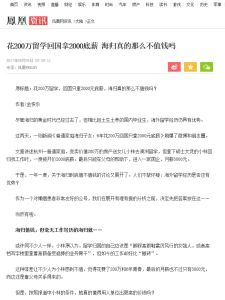Join getAbstract to access the summary!

Join getAbstract to access the summary!
Jin Kuaile
Why Are Overseas Returnees to China Worth So Little Now?
Spending ¥2 Million on an Overseas Education for a Base Salary of ¥2,000
Phoenix Weekly, 2017
What's inside?
Will overseas returnees with foreign degrees fare poorly in China’s job market?
Recommendation
People in China refer to students who return to China after completing their educations abroad as hai gui, or “Sea Turtles.” Once a highly elite group that could take their pick of jobs in the market, Sea Turtles now face a new reality of lower pay and a hostile job market. One Sea Turtle who – after paying ¥2 million [$300,000] on her overseas education – only received job offers that paid between ¥2,000 and ¥4,000 a month. Her example pushed the socioeconomic phenomenon to the surface again. Writer Jin Kuaile from news outlet Phoenix Weekly examines why Sea Turtles have fallen out of favor, how they fare against local competition and how they can increase their value. Although her article is thorough, she doesn't touch on some of the indirect reasons for the Sea Turtles' decline in job market value. In an article on the same subject The Economist also noted that Chinese managers, who used to have a chip on their shoulders, are now acting more confident in picking locally educated candidates. Also, according to the same article, Sea Turtles can be a mistmatch for Chinese companies, as they “often cling to quaint Western notions like transparency, meritocracy and ethics, which puts them at a disadvantage in China’s hyper-Darwinian economy.” getAbstract recommends this article to people who consider working in China, business managers of multinational corporations, Chinese citizens who are working or studying abroad, and – even more so – those who are thinking about it.
Summary
About the Author
Jin Kuaile is a reporter for Phoenix Weekly, a leading magazine covering politics, current affairs, finance, business, social issues and culture.


















Comment on this summary